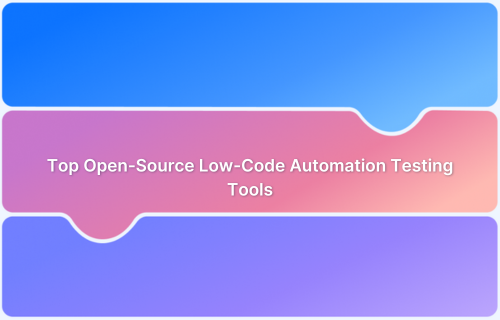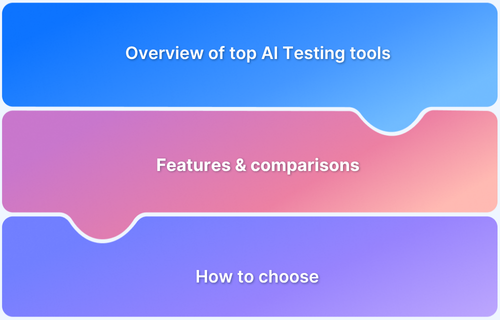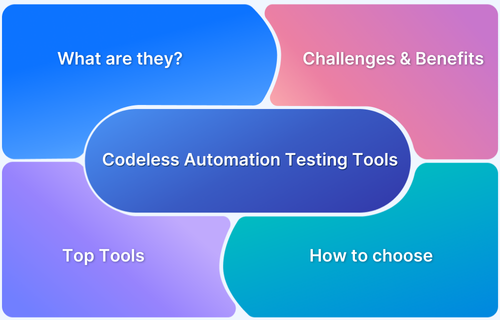TestSigma is a popular tool in the realm of automated testing, offering both low-code and no-code capabilities for creating tests across various platforms.
While TestSigma provides a robust solution for teams aiming to simplify their automation processes, there are several factors that may lead organizations to explore alternatives.
Overview
Top TestSigma Alternatives:
- BrowserStack Low-Code Automation: AI-powered self-healing with real-device testing for web and mobile automation.
- Katalon Platform: Unified low-code automation supporting web, API, desktop, and mobile testing with AI features.
- Reflect.run: No-code, end-to-end testing platform with interactive cloud browser for easy web action recording and automation.
- UI Bakery: Rapid internal app creation with drag-and-drop UI components and flexible data integration.
- Appsmith: Open-source platform with strong integrations and community support for internal tool development.
- Appian: Enterprise-grade platform for automation and complex workflows with AI/ML orchestration.
- Leapwork: Visual flow-based no-code automation tool with reusable workflows across platforms.
- Rainforest QA: Cloud-based testing with AI stabilization and on-demand crowd testing.
- Testim: Low-code testing platform with AI-driven maintenance and JavaScript flexibility.
- Virtuoso QA: Natural-language and AI-powered test authoring on a scalable cloud platform.
- Ghost Inspector: Browser-based no-code testing with recording, scheduling, and monitoring features.
- Mabl: Low-code automation for web and mobile with AI-powered self-healing and modular tests.
- Functionize: AI-powered codeless testing with Chrome recording and scalable cloud execution.
- Mendix: Comprehensive low-code platform for building web, mobile, and IoT apps with AI-assisted automation.
- Studio Creatio: No-code CRM and workflow automation platform with AI-powered design and compliance tools.
This article highlights the features of TestSigma, outlines why some teams may seek alternatives, and explains why BrowserStack Low-Code Automation stands out as an ideal choice for those in need of a flexible, scalable, and efficient testing solution.
What is TestSigma
TestSigma is a no-code and low-code automation platform that simplifies creating enterprise-grade automated tests for web, mobile, desktop, and APIs.
Its intuitive interface allows teams of all skill levels to automate tests using plain English commands or recordings. With self-healing capabilities, it ensures test stability over time, reducing manual updates.
Key Features:
- Plain English Test Creation and Recording: Allows non-technical users to create automated tests using simple, human-readable language, or by recording manual interactions.
- Cross-Platform Automation: Supports automation across web, mobile, desktop, and API platforms, making it a versatile solution for various testing needs.
- Parallel Execution on Multiple Configurations: Enables parallel execution on over 3,000 different browser, OS, and device configurations, ensuring extensive test coverage.
- Cloud-Based Management with CI/CD Integration: Seamlessly integrates with CI/CD pipelines, providing a cloud-based platform for easy management and scaling of test executions.
Why Consider TestSigma Alternatives?
While TestSigma offers a strong and intuitive platform, there are several reasons why teams might consider alternatives:
- Many of TestSigma’s advanced features, including certain integrations and premium support, are locked behind higher pricing tiers.
- For more complex testing scenarios, TestSigma may require scripting knowledge, which could make it less suitable for teams that prefer a fully no-code or low-code solution.
- Teams new to test automation may face a learning curve in understanding the platform’s full capabilities, particularly if they are not familiar with automation concepts.
- Some teams with large-scale testing needs or complex deployments may find that they need to purchase additional paid features or upgrade their plan to meet their demands.
TestSigma Alternatives: Quick Overview
Below are the top alternatives to TestSigma, each offering unique features to suit various testing and automation needs.
| Tool | Pros | Cons | Free Plan |
|---|---|---|---|
| BrowserStack Low-Code Automation | AI-powered self-healing, real-device testing, low-code authoring | Advanced features require paid plans | ✅ Free plan for unlimited test creation |
| Katalon Platform | Unified low-code automation supporting web, API, desktop, and mobile testing | Some AI features still in beta or limited release | ✅ |
| Reflect.run | No-code, end-to-end testing with cloud-based browser integration | Limited to web app testing | ✅ (restricted) |
| UI Bakery | Rapid internal app creation with drag-and-drop UI components | Limited mobile support, learning curve | ✅ |
| Appsmith | Open-source platform with strong integrations and community support | Performance bottlenecks on complex pages | ✅ |
| Appian | Enterprise-grade automation, complex workflows | Expensive, steep learning curve | ❌ |
| Leapwork | Visual flow-based no-code automation with reusable workflows | Expensive, complex setup | ❌ |
| Rainforest QA | Cloud-based testing with AI stabilization and on-demand crowd QA | Web-only, costly | ❌ |
| Testim | Low-code testing platform with AI-driven maintenance and JavaScript flexibility | Paid advanced features | ✅ |
| Virtuoso QA | Natural-language and AI-powered test authoring | No support for desktop and mobile apps | ❌ |
| Ghost Inspector | No-code browser-based testing with recording, scheduling, and monitoring | Limited branching logic and complex test scenarios | ✅ |
| Mabl | Low-code web and mobile testing with AI-powered self-healing | Proprietary platform, requires subscription | ❌ |
| Functionize | AI-powered codeless testing with Chrome plugin recording | Limited to web testing, enterprise pricing | ❌ |
| Mendix | Comprehensive low-code platform for building web, mobile, and IoT apps | Expensive, complex governance | ✅ |
| Studio Creatio | No-code CRM and workflow automation with AI-powered design tools | Minimum license requirements may exclude small teams | ❌ |
Top 15 TestSigma Alternatives
Below are the leading platforms teams often compare with TestSigma. Each tool provides distinct strengths to meet different testing and development needs.
1. BrowserStack Low-Code Automation
BrowserStack Low-Code Automation allows teams to build, run, and maintain tests without needing code.
With AI-powered self-healing and low-code authoring agents, it speeds up test creation by up to 10x and reduces build failures by up to 40%, delivering faster, more stable automation for both technical and non-technical users.
Key Features:
- Test Recorder: Easily capture user actions such as clicks and form entries and transform them into automated test steps that include both functional and visual validations.
- Readable Test Steps: Actions recorded are automatically translated into simple English instructions that are easy for any team member to read, review, and modify without technical expertise.
- AI-Powered Self-Healing: Uses artificial intelligence to detect when UI elements change and updates the test automatically to prevent failures, reducing the need for repetitive manual maintenance.
- Low-Code Authoring Agent: Uses AI to turn natural language prompts into executable test steps, automating tasks from simple instructions.
- Cross-Browser & Mobile Testing: Provides access to a real device cloud that includes thousands of browsers, operating systems, and mobile devices to ensure test accuracy across environments.
- Reusable Modules: Allows teams to save frequently used test sequences as reusable modules that can be inserted into multiple test cases to reduce duplication and simplify test maintenance.
- Private Environment Testing & Email Notifications: Enables secure testing on staging, localhost, and internal environments, while sending detailed email reports of build pass or fail status for stakeholder visibility.
Pricing:
- Free Plan: Offers unlimited test creation along with AI-generated test data, intelligent wait handling, API steps, secure private environment testing, video debugging, and 24×7 support.
- Paid Plan: Unlocks AI agents, advanced self-healing, parallel execution, and enterprise-grade features, with custom pricing based on organizational needs.
Get Started with BrowserStack Low Code Automation for Free
2. Katalon Platform
Katalon is a unified low-code automation platform that supports web, API, desktop, and mobile testing. It combines AI-driven features with an intuitive interface, making automation accessible across technical skill levels.
Key Features:
- Visual testing for UI regressions and image-based issues
- StudioAssist for guided low-code scripting and auto-documentation
- Direct Jira integration for creating and managing test cases
Pros:
- Strong integration with CI/CD and test management tools
- Encourages collaboration between technical and non-technical users
- AI features speed up test creation and reduce execution time
Cons:
- Some AI features like TrueTest are still in beta/limited release
- Complex test logic may require scripting
- Advanced enterprise management available only in premium tiers
Pricing: Free starter edition with limited features. Paid plans start at $84/user/month.
Learn More: Top 15 AI Testing Tools
3. Reflect.run
Reflect.run is a no-code, end-to-end testing platform that uses an interactive cloud browser to record and automate any web action, designed for ease of use.
Key Features:
- Cloud-based interactive browser for test authoring
- Automatic selector generation to reduce test flakiness
- In-app workflow builder for scheduling and notifications
Pros:
- Simple, fast test creation for users of all skill levels
- Supports complex web interactions like drag-and-drop and file uploads
- Fully hosted infrastructure with comprehensive reporting
Cons:
- Primarily for web applications
- Customization for highly dynamic apps may be challenging
- Higher usage leads to increased costs
Pricing: 14-day free trial available. Paid plans start at $212/month.
4. UI Bakery
UI Bakery allows users to create custom internal applications and dashboards rapidly, without learning advanced UI frameworks. Its platform offers deep data connectivity, a rich set of UI components, and optional coding for advanced use cases.
Key Features:
- Integrates with SQL, NoSQL, REST APIs, and third-party data sources
- Visual workflow and design system with advanced branding controls
- Ability to add business logic using SQL, Python, or JavaScript
Pros:
- Enables rapid data-driven app development
- Highly flexible data integration and transformations
- Professional design system proven by open-source products (ngx-admin, UI Kitten)
Cons:
- Some learning curve for integrating advanced code logic
- Limited out-of-the-box mobile app support
- Bulk of templates focused on admin/internal tools
Pricing: Free plan available (limited users). Paid plans start at $5/user/month or $10/developer/month.
5. Appsmith
Appsmith is an open-source low-code platform to build fluent, responsive web interfaces powered by any backend, with drag-and-drop widgets and built-in version control.
Key Features:
- Extensive widget library with AI and database integrations
- Connects easily with REST/GraphQL APIs, databases, and SaaS apps
- Full logic customization using JavaScript, with built-in IDE and debugging
Pros:
- Open source under Apache 2.0, with a strong community
- Flexible deployment: Cloud, self-hosted, or air-gapped environments
- Built-in security: role-based access, SSO, audit logs
Cons:
- Performance bottlenecks with complex pages or large data sets
- Limited widget library compared to some competitors
- Advanced UI customizations may require additional coding
Pricing: Free plan (up to 5 users) with limited features. Business plan costs $15/user/month; enterprise pricing is custom.
6. Appian
Appian is an enterprise-grade platform focused on automating end-to-end workflows and case management. It offers both low-code and no-code capabilities to streamline complex workflows.
Key Features:
- Process modeling and automation for end-to-end workflows
- Built-in AI/ML orchestration and advanced analytics
- Prebuilt integrations with ERPs and legacy systems
Pros:
- Scales effectively for large, regulated industries
- Manages complex, high-volume automation workflows
- Strong governance, audit, and security features
Cons:
- Pricing only available on request and can be costly
- Not ideal for rapid prototyping or small-scale projects
- Steep learning curve for non-technical business users
Pricing: Available on request for business and enterprise customers.
7. Leapwork
Leapwork is a fully visual, no-code test automation platform that uses flowcharts to create tests for web, desktop, and enterprise systems. It’s designed for fast test creation with intuitive flowcharts and AI-powered stability.
Key Features:
- Drag-and-drop flowchart-based test creator
- Cross-platform automation (web, desktop, legacy apps, SAP)
- Self-healing tests powered by AI/ML
Pros:
- Fast onboarding for QA/business users and automation novices
- Effective for high-volume regression and end-to-end testing
- Enterprise-grade security, audit, and compliance features
Cons:
- Expensive for enterprise-scale deployments (custom pricing)
- Some advanced automation requires vendor support
- May need infrastructure setup for optimal CI/CD use
Pricing: Custom pricing available.
8. Rainforest QA
Rainforest QA is a cloud-based no-code automation platform for web apps, combining easy visual test authoring, machine intelligence, and on-demand crowd QA for fast test coverage.
Key Features:
- Visual, no-code test authoring and editing
- Self-healing/AI-stabilized test scripts
- Parallel test execution infrastructure
Pros:
- Fast test creation for teams with no coding skills
- Includes all infrastructure for automation and test management
- Human crowd QA augments automation for complex scenarios
Cons:
- Primarily for web apps, limited desktop or mobile support
- Pricing can escalate for large test volumes
- Advanced customization is limited
Pricing: Custom pricing based on usage.
9. Testim
Testim is an AI-powered low-code testing platform for functional and visual web applications, focused on rapid test authoring, intelligent maintenance, and scalability.
Key Features:
- Visual flow recording with configurable test steps
- AI-based self-healing locators to minimize flaky tests
- JavaScript extensibility for advanced logic and flexibility
Pros:
- Authoring and maintenance up to 90% faster than coded frameworks
- Stable, low-maintenance tests supported by machine learning
- Scales easily for large teams and projects
Cons:
- Advanced visual validation requires paid add-ons
- Primarily web-focused, limited cross-platform support
- Premium features available in higher-tier plans
Pricing: Free trial available. Custom pricing for paid plans.
Learn More: Comprehensive Guide to Low-Code Development
10. Virtuoso QA
Virtuoso offers low-code and no-code test automation for web apps using natural-language and AI-driven test authoring. Its cloud-first architecture scales for both manual and automated QA workflows.
Key Features:
- NLP-based test scripting in plain English
- AI-powered automatic element discovery and test healing
- Parallel test execution on cloud devices/browsers
Pros:
- Easy to adopt, even for non-technical users
- High-speed authoring with reduced maintenance overhead
- Integrates natively with CI/CD pipelines and reporting tools
Cons:
- No support for desktop or native mobile apps
- Restricted options for advanced scripting or custom logic
- Full feature access and enterprise support at premium cost
Pricing: Custom pricing available.
Also Read: Why No Code is the Future of Testing
11. Ghost Inspector
Ghost Inspector is a no-code web automation and monitoring tool. It allows teams to create, schedule, and run tests directly through a browser extension with cloud execution.
Key Features:
- Browser-based test recorder that supports complex web actions
- Visual editor for modifying, grouping, and scheduling tests
- Built-in integrations with Slack, GitHub, Jenkins, Trello, and more
Pros:
- Simple for non-coders to get started quickly
- Flexible scheduling and monitoring for DevOps workflows
- Test maintenance aided by element update automation
Cons:
- Web-focused, lacks support for mobile or desktop apps
- Advanced branching logic less flexible than code-based tools
- Free tier limits frequency and integrations
Pricing: Paid plans start at $109/month.
12. Mabl
Mabl is a low-code test automation platform designed for web and mobile testing. It combines intuitive point-and-click test creation with AI-based self-healing and advanced developer options for complex scenarios.
Key Features:
- Intuitive test recorder for web, mobile, and API scenarios
- AI-based self-healing to reduce maintenance when UIs change
- Modular test flows with support for JavaScript and Appium snippets
Pros:
- Accessible to all team members, regardless of coding expertise
- Machine learning-based test adaptation significantly reduces maintenance
- Supports unified end-to-end testing: UI, API, and advanced workflows
Cons:
- Works best for record-and-playback flows, complex logic requires coding
- Proprietary platform, not open source
- Limited integrations with some test management tools
Pricing: Custom pricing upon request.
Also Read: 13 Open Source AI Testing Tools
13. Functionize
Functionize is an AI-powered codeless testing platform that helps teams rapidly automate web testing using a Chrome plugin and cloud infrastructure, blending simplicity with enterprise features.
Key Features:
- AI-driven test generation and self-healing capabilities
- Chrome plugin for quick test recording
- Cloud-hosted platform enabling parallel execution and scalability
Pros:
- Low barrier to entry; tests can be built by product experts, not just developers
- Runs stable, scalable tests using AI
- Easily integrates with existing CI/CD and enterprise systems
Cons:
- Best suited for large enterprises, may not be ideal for small teams
- Some features are locked behind higher-priced tiers
- Focuses primarily on web testing
Pricing: Custom pricing available.
Also Read: Top 12 AI Automation Testing Tools
14. Mendix
Mendix is a comprehensive low-code platform for building web, mobile, and IoT apps with model-driven development and AI-assisted automation, used for enterprise-scale agile delivery.
Key Features
- Visual IDE for data models, workflows, and UIs
- Embedded AI for app development (Maia) and machine learning
- Integrated DevOps/project management with collaboration tools
Pros
- Delivers multi-channel apps (native mobile, PWA, web) rapidly
- Enables collaboration across business, IT, and mixed agile teams
- Rich marketplace for templates, widgets, integrated components
Cons
- Steep learning curve for advanced logic and customization
- Pricing escalates for enterprise-grade features
- Complex governance and role management for larger organizations
Pricing
- Free tier has basic features, standard pricing is €900/month
15. Studio Creatio
Studio Creatio is a no-code platform focused on CRM, workflows, and enterprise automation, offering AI-powered design tools and strong compliance capabilities.
Key Features:
- Drag-and-drop workflow and integration design
- AI-assisted app and UI generation
- Pre-built business process templates
Pros:
- Empowers non-technical users with visual builders
- Scales well for complex enterprise workflows
- Provides robust compliance and governance options
Cons:
- Advanced features are tied to higher-priced tiers
- Limited support for mobile apps compared to desktop
- Minimum license requirements may exclude small teams
Pricing: Starts at $25 per user per month, with no free plan.
Why Choose BrowserStack Low-Code Automation?
BrowserStack Low-Code Automation stands out as a robust alternative to TestSigma for several key reasons:
- BrowserStack allows teams to run tests on real devices, ensuring more accurate results compared to the emulated devices.
- BrowserStack’s AI-powered self-healing automatically adapts to changes in the UI, ensuring stability and reducing manual test maintenance.
- BrowserStack offers seamless scaling across real desktop browsers and mobile devices, making it easier to cover a wide range of configurations and browsers without additional infrastructure setup.
- With a free plan offering unlimited test creation, BrowserStack allows teams to scale efficiently without worrying about expensive enterprise plans.
- It supports testing for web and mobile apps on real devices, providing comprehensive cross-browser and cross-platform coverage.
Conclusion
While TestSigma is an excellent choice for low-code test automation, some teams may find that it doesn’t fully meet their needs due to pricing limitations, customization challenges, and learning curves.
BrowserStack Low-Code Automation provides a flexible and powerful alternative, with real-device testing, AI-driven self-healing, and extensive cross-platform support, all at more accessible pricing tiers.
By choosing BrowserStack, teams can ensure faster, more reliable test automation that scales with their needs, while reducing maintenance and manual updates.








